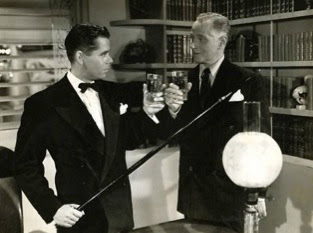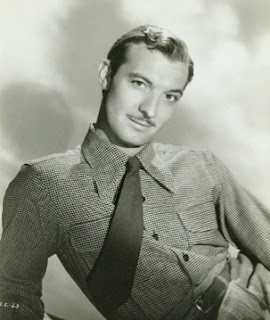In honor of Noirvember, an annual celebration of all things film noir, I am reposting this piece I did a few years back about the movie Her Kind of Man (1946), not to be confused with the later His Kind of Woman. It sure as hell ain't no Laura or Out of the Past, but Her Kind of Man has plenty of curious twists and turns, and is well worth a watch. I'll be posting more Noirvember tributes as the month progresses.
 |
| Three on a match: Zach, Janis & Dane |
What sets this decidedly B-movie apart from the usual film noir fare of the period is the other passionate triangle at its core. Like another of my faves, Gilda, this flick has a carefully hidden homoerotic subplot that bubbles up through the cracks in its screenplay. Gilda was released shortly before Her Kind of Man and I wonder if the latter wasn’t produced quickly to cash in on the A-list flick’s appeal. Directed by Frederick de Cordova, it bristles with flair but falls a bit short of the mark.
 |
| Staff and Rod: Glenn Ford sizes up his boss George Macready |
In Gilda, you will recall, the relationship between handsome, young Glenn Ford and his older mentor, played with chilling sangfroid by George Macready, oozes a sinister sort of subterranean subtext that makes you wonder whether Macready is more in love with Ford than his sultry wife Rita Hayworth (no small feat considering how gorgeous Hayworth is in that film.) All the signs are there, though. The way the two meet late at night in an alley; how Macready sets Ford up with new clothes, fancy digs, fine jewelry and a high paying job; and the jealousy he exudes once Ford and Hayworth hook up. Such hidden gay angles were often evident in 1940s mysteries and suspensers. John Huston’s take on The Maltese Falcon played up Peter Lorre’s effeminate character and the queer rapport between Sydney Greenstreet and his “gunsel,” Wilmer, played by Elisha Cook, Jr.
 |
| Gunsel for Hire: Falcon fortune hunters |
In Her Kind of Man, the romantic ménage à trois is even more convoluted. First off, we have Zachary Scott playing a tough crime czar (a bit of a stretch for the refined esthete from Texas) who has a strange tie to his cabaret owning sister, played with elegant restraint by Faye Emerson.
 |
| Twisted Sister: Faye Emerson |
Then a nightclub singer, Janis Paige, captures his interest. At first she just flirts with Scott, then marries him, all the while being courted by another man, Dane Clark — shades of Gilda. Earlier, after nearly being shot by a disgruntled gambler named Bender, Scott is rescued by a mysterious young man, played by Harry Lewis, who goes by the deliciously camp handle, “Candy.” The bow-tie-sporting lad is smitten with Scott, looks up to him as a dark knight, and will do anything to join his gang. When Bender, soothing his wounds, asks Candy what his connection is to Scott, the gunsel shoots back, “I’m his governess.” Soon after, Scott slaps Candy hard across the face for being indiscreet. Scott sends him away, then says revealingly, “Some guys are like women. Slap them down and they’ll love you even more.”
 |
| Dandy Candy: Harry Lewis |
The bizarre relationship is further underscored when in another confrontation Scott slaps Lewis a second time. Janis Paige, who stumbles in as Candy leaves, rubbing his cheeks, says to him, “Did you get your bonus?” That’s an odd touch of sarcasm for a wife to make to one of her husband’s underlings, especially since she is supposed to be the “good girl” in the flick. The S/M subtext is practically explicit. Her role as honorary fag hag is further illuminated in a funny dance number she does at the club, featuring a group of sailors who seem more interested in each other than her.
 |
| My Salts!: Janis Paige with her "sailors" |
This is followed by a scene in which Scott is supposedly cheating on his wife with two lissome party girls, with Candy standing guard. Suddenly the two men leave together and one of the girls cries out to Candy, “Hey, what about us?” Candy shrugs his shoulders wistfully, smiles, and follows after Scott. Moments later, when Scott is tracking down Paige, who has run off again with Dane Clark, Candy says to Scott, “Hey Boss, I never thought I’d see you chase a dame.” Scott counters by saying, “Only when there’s an angle… a reverse angle.” One doesn’t have to probe too deep into tortured dialogue like that.
 |
| Playing all the angles: homme fatal Zach |
The fresh double talk continues when Dane Clark comes up against Candy, whom he keeps calling “sucker.” He’s been beaten up by Candy and his henchmen after a sparring match with Scott (one of the funnier sequences in the film since it is obviously just an excuse to get both Clark and Scott to take their shirts off.) Clark thanks Lewis for the “massage” he gave him, adding, “You wouldn’t want one yourself, would you?” If as much screen time were given to Clark and Paige as a romantic couple one could overlook this ripe dialogue between the male characters, but Candy is in almost every scene.
 |
| The Mirror Crack'd: Zach, sister slayer. |
At the end of the movie (SPOILER ALERT), after snitching on his boss, Candy still runs to save Zachary Scott, but to no avail. Scott shoots his sister dead (a Freudian alter ego scenario that seems to come right out of a Balzac droll story) then is killed by her vengeful husband, Joe, played by George Tobias. Candy, surprisingly, survives, as do Clark and Paige, who, one assumes, will live on happily ever after, making little babies and avoiding the evil, twisted corners of the underworld.


